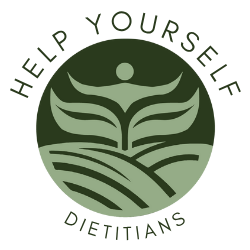Irritable Bowel Syndrome (IBS)
How our dietitians can help
- Personalised support: We work with you to uncover food and lifestyle triggers and guide you through managing IBS in a way that suits your life.
- Unravelling complexity: Many of our clients have overlapping conditions like IBD, diverticulitis, reflux, or functional dyspepsia- our approach is always customised to your unique needs.
- Flexible dietary strategies: We don’t rely on a one-size-fits-all low FODMAP diet. Instead, we aim to reduce symptoms without unnecessary food restriction.
- Regain food enjoyment: Our dietary management approaches accommodate fear of food or eating that understandably results from associated symptoms over time.
- Holistic care: Often, dietary approaches work better when combined with other lifestyle strategies. We help you explore the range of available, evidence-based gut-brain therapies, including how you could integrate them into a plan that suits your lifestyle and preferences.
- Expert guidance with empathy: Drs Kerith Duncanson and Georgina Williams bring deep IBS research experience and a compassionate, individualised approach to every client.
At Help Yourself, we’re here to work with you- not just tell you what to eat. Our dietitians take the time to understand what foods or lifestyle habits might be triggering your symptoms, and we’ll guide you step by step through managing IBS in a way that fits your life.
We know that IBS often doesn’t come alone. Many of our clients are also dealing with other health issues or overlapping gut conditions like IBD, diverticulitis, reflux, or functional dyspepsia. That’s why we tailor our approach to suit your unique mix of symptoms, past experiences, and food preferences. We’ll talk through all your options and help you find what works best for you.
The low FODMAP diet is one approach to managing IBS, but it’s not for everyone. It’s one of many possible approaches to understand your food triggers, and it’s not meant to be followed long-term or without support. In fact, we often take a different route, focusing on finding your threshold for triggers rather than cutting out everything. This helps ease symptoms without making food feel like the enemy. Our goal is to minimise symptoms while maximising your range of foods.
And if dietary changes alone aren’t enough, that’s okay too. Some people find real relief through gut-brain therapies, and we can help you explore those options as part of a holistic plan that fits your lifestyle and supports your wellbeing.
More about IBS
What is Irritable Bowel Syndrome (IBS)?
With irritable bowel syndrome affecting about 1 in 10 Australians, you are not alone in living with this bothersome condition. It is diagnosed as diarrhoea-predominant (IBS-D), constipation-dominant (IBS-C), or mixed-type IBS (IBS-M) based on frequency of abdominal pain and bowel motion consistency and frequency. Symptoms include bloating, wind, urgency to use the toilet or incomplete bowel movements. Stress, low fibre diets, antibiotics, and family history may increase risk of IBS, which is more commonly reported by women.
Gut sensitivity, stress, infections, or changes in gut bacteria may trigger IBS. The brain can overreact to signals from the gut, causing symptoms even before food reaches the bowel. Doctors diagnose IBS by assessing your symptoms and ruling out other conditions. They may use tests like colonoscopies or breath tests to exclude other causes.
Drs Kerith Duncanson and Georgina Williams bring deep research experience in IBS and gut health to our team, so you’re in expert hands. We make sure that expertise comes with personalisation and empathy so your individual needs and circumstances are our priority.
Our IBS publications
- Duncanson, K., Williams, G.M., Hoedt, E.C., Keely, S. and Talley, N.J. Dietary intake differs from self-reported food avoidance and intolerances in people with irritable bowel syndrome. Gastroenterology, 2024. 166(5), S-875.
- Duncanson, K., Tikhe, D., Williams, G.M. and Talley, N.J. Irritable bowel syndrome–controversies in diagnosis and management. Expert Review of Gastroenterology & Hepatology, 2023, 17(7), pp.649-663.
- Burns, G., Roberts, F., Wark, J.A., Fowler, S., Jones, M.P., Duncanson, K., Talley, N. and Keely, S., Serological and Faecal Markers of the Irritable Bowel Syndrome: A Systematic Review and Meta-Analysis. Available at SSRN 5263153.

Book with Kerith or Georgina
Kerith and Georgina specialise in various gastrointestinal conditions and symptoms. Their consulting work with clients complements their research in gastrointestinal nutrition.
Face-to-face appointments
Kerith offers appointments at Newcastle Gastroenterology and Health HQ Salamander Bay.


Contact Us
Email – office@helpyourself.com.au

